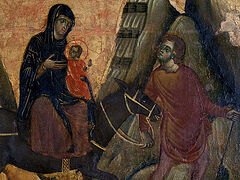I will venture to share my own experience. Though it’s bitter, that’s what faith was given to us for—so our bitterness can turn into joy.
At some point my attitude to confession in church became formal and cold. That is, I didn’t care about what to say at the analogion. I stopped preparing for confession and thinking it over in advance. I thought I wasn’t up to it: It was too hard a time in my life. Due to my mother’s serious illness and helplessness, I couldn’t always get out to go to church. And even when I got out and finally entered the church and heard “Blessed is the Kingdom...,” I was worried the whole time that my phone would vibrate in my pocket and my mother would say she was feeling very bad, and I would have to urgently return home rather than approaching the chalice. “If only God would allow me to take Communion!” I thought. “After all, I don’t have anything new to say in confession. Everything’s the same as last time. If only it would go faster!”
Of course, I would ask myself questions: “Why aren’t I changing and getting better after a year-and-a-half of repeating the same things in confession?” “Is there at least a little repentance in me, at least for selfishness?...” But much more often I would ask myself about something else: “How can I endure everything that has befallen me?”
Alas, I’m not the only one who has come to see confession as just a “pass” to Communion. We often see people who confess for just half a minute... We’re glad they don’t hold up the line, and we’re angry at those who do hold it up. The modern parishioner is inclined to perceive the Sacraments as something material and concrete, and confession as some kind of abstraction or formality. I’m afraid I perceived it the same way... But suddenly something began to change for me.
Here’s the first thing I thought of. What happens at the analogion, what the priest is witness to isn’t just “working on mistakes.” This is one of the most important and saving Sacraments of the Church—the Sacrament of repentance, the Sacrament of the absolution of sins.
A Sacrament is something incomprehensible to our mind, that can’t be described in words, and which is celebrated neither by man nor by an angel, but by God alone. For the first time I really heard an extract from the Gospel that I had known for a long time:
When Jesus saw their faith, He said unto the sick of the palsy, Son, thy sins be forgiven thee. But there was certain of the scribes sitting there, and reasoning in their hearts, Why doth this man thus speak blasphemies? who can forgive sins but God only? And immediately when Jesus perceived in His spirit that they so reasoned within themselves, He said unto them, Why reason ye these things in your hearts? Whether is it easier to say to the sick of the palsy, Thy sins be forgiven thee; or to say, Arise, and take up thy bed, and walk? But that ye may know that the Son of Man hath power on earth to forgive sins, (He saith to the sick of the palsy,) I say unto thee, Arise, and take up thy bed, and go thy way into thine house (Mk. 2:5-11).
Indeed, Who has the power to free a man from guilt and absolve his sin? Only the One against Whom man sins—God. By absolving sins, Christ confirms His Divine dignity. We all can and must forgive each other, pray to God for mercy to sinners, and remember that we’re not judges of our neighbors at all. But there’s no way we can absolve a man of his sin against God for Him. And the priest wouldn’t be able to do it if he were acting from himself, according to his own will. But he does it with the power given to him in the Sacrament of the priesthood—the authority received from Christ Himself: “… And, I, His unworthy Priest, through the power given unto me by Him, do forgive and absolve you from all your sins. In the Name of the Father, and of the Son, and of the Holy Spirit.”
The Church, in the person of the priest, absolves our sins, because God is in it. We come up to the analogion, the cross, and the Gospel not to self-criticize and get a “pass” to the chalice, but for God to work the incomprehensible with us, restoring the connection damaged by our sins.
Some may say: “Okay, what’s new about that? That’s from the catechism, and every Orthodox Christian should know it.” That’s the point: To know is one thing, and to accept this knowledge in the heart and live by it is another. Theoretical knowledge is the seed that fell on the rocky ground and didn’t take root (cf. Mt. 13:5). We easily forget what we simply know, especially in times of trials and tribulations. My example confirms this. And when we say: “It just dawned on me!” it means our hearts have opened up, and the seed has gotten a chance to take deeper root.
So, it dawned on me, and I began to think further about my attitude to confession. The Sacrament of repentance is the Sacrament of our cooperation with God. After all, if we’ve confessed a specific sin, it doesn’t mean the sin is gone, that it’s vanished as if by magic. It means something else: That seeing our repentance, seeing that we ourselves have taken the first step and stretched out our hand for His help, the Lord stretches out His hand to us, helping us climb the very steep path of rejecting sin, of delivering ourselves from it and changing for the better. Naming a sin at confession is, it turns out, only the first step. It must be ongoing.
That’s how I found the answer to the question of why I wasn’t changing for the better, repeating the same words in confession many times—because there was no first step on my part, no outstretched hand, no determination to take the second step with God’s help; but there was only: “If only it would go faster!”
I remember my confessions from the first years of my life in the Church—they were completely different! No wonder I felt like a ship in distress. At that time, every confession of a specific sin or wrongdoing was a threshold beyond which something new would begin. And then troubles and hardships entered my life. At times I felt really bad ... and self-pity prevailed over self-discipline: “I can’t be strict with myself now, I don’t have the strength for it. It’s so hard for me that the Lord will definitely forgive me everything.”
Meanwhile, I knew when and why, amidst my sorrows, it becomes easier for me, when, in spite of all misfortunes, joy comes: when God’s grace touches my soul; when, with all my imperfections, I still feel my connection with Christ; when I directly feel Him in me and me in Him. It isn’t because of my merits—there are none—but because of His mercy “to publicans and sinners.” By His grace I understand that my state depends not only and not so much on the external circumstances of my life as on how much I’m with Christ. St. Silouan the Athonite says:
“When the peace of Christ enters the soul, then it’s glad to sit like Job among the ashes and behold others in glory.”
Happiness is possible—it’s life with God. What separates us from Him? Sin. “It’s too hard for me to repent” is like saying, “I’m too sick to be treated.”
Some time ago I read that repentance shouldn’t be a one-time act, but the permanent state of a Christian; that being in the Church, in essence, is repentance. What does that mean? That we’re called to always remember our sinfulness and not perceive it as the norm. After all, we’re inclined to justify our sins by their inevitability—”...for there is no man who lives yet does not sin”—or even by their “naturalness.”
In fact, sin is unnatural for man, and indeed it’s the most terrible wound: …sin, when it is finished, bringeth forth death (Jas. 1:15). And here it’s not just a question of our state of mind, but of eternal death. There’s only one means of salvation from it—repentance. It’s no coincidence that Christ’s earthly ministry was preceded by the call of St. John the Forerunner: Repent ye: for the Kingdom of Heaven is at hand (Mt. 3:2). It’s no wonder that some monastery elders, when asked, “What are you doing here, within these walls, for so many years?” often answer with one word: “Repenting.”
And that, I repeat, is what dawned on me... And it required a radical change, a turn in my whole inner life. Despondency immediately screamed that such a turn was impossible for me, that I had neither the resolution nor inner strength for it: I couldn’t even stop justifying myself...
And then I recalled the following words of the spiritual author Sergei Iosifovich Fudel:
“Our spiritual impotence, of course, is half imagined by us to justify our inaction. We can still do something, but we really don’t want to.”
There is something I can do—right now. A little bit, really. Maybe one tiny step... but you have to take it, and then the second step will follow.
I’m afraid of the next confession that awaits me. I’m afraid that it must finally be real. This fear is definitely a blessing. I have already approached the analogion, the cross, and the Gospel so many times without any fear. That can’t happen anymore.





